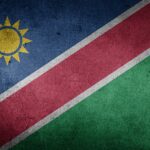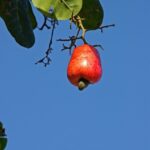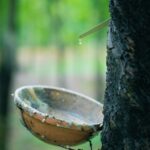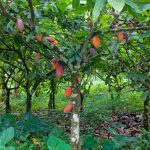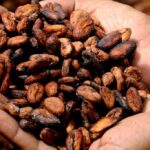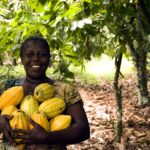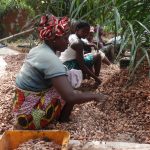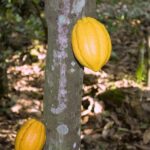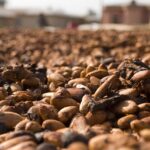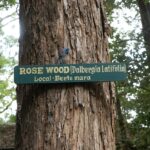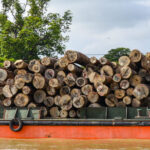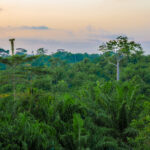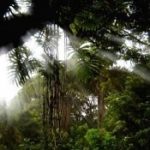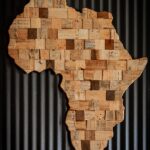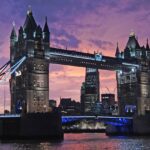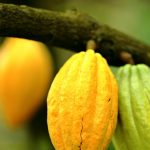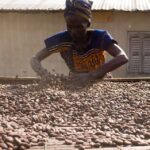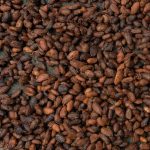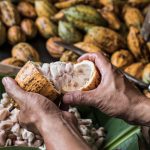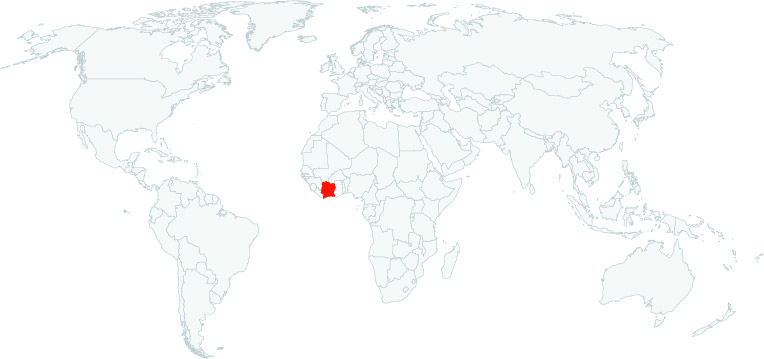
Between 2001 and 2023, Africa recorded the world’s highest growth in cultivated agricultural land, according to the Food and Agriculture Organization (FAO). In a report published on June 19, the UN agency stated that during this period, the global area of cultivated land increased by 78 million hectares. Africa accounted for 96% of this expansion, adding 75 million hectares. According to the FAO, this growth was primarily driven by the expansion of temporary crops, which have a growing cycle under one year. These include cereals and tubers like maize, rice, sorghum, and cassava. At the same time, permanent crops such as cocoa, coffee, oil palm, and rubber expanded by 18 million hectares, a 65% increase. West Africa, in particular, saw a 79% increase in agricultural land dedicated to these crops over the period, while in Central Africa, the area devoted to these value chains doubled.
In its report, the FAO notes that the rise of extensive agriculture has led to massive deforestation. The UN agency estimates that Africa lost 82 million hectares of forest cover between 2001 and 2023.
Notably, in Côte d’Ivoire, the world’s top cocoa producer, about 45% of total deforestation and forest degradation is attributed to cocoa cultivation. In a 2023 report, researchers from the Catholic University of Louvain in Belgium revealed that around 2.4 million hectares of forest were replaced by cocoa plantations in the country between 2000 and 2019. cocoa farming was directly linked to the loss of 386,000 hectares of forest in protected areas in Côte d’Ivoire and Ghana between 2000 and 2020.
Côte d’Ivoire is the world’s top producer of both raw cashews and cola nuts, with over 1 million tonnes of cashews and 250,000 tonnes of cola nuts produced annually. Maize also plays a central role in domestic food security.
Officially opened on Wednesday 28 May in the Ivorian economic capital Abidjan, the exchange began formal trading on Friday, with the aim of bringing transparency, structure, and improved income to the region’s agricultural producers. For now, the platform lists three key products – raw cashew nuts, cola nuts, and maize – chosen for their strategic importance to the national economy.
The Ivory Coast is steadily gaining on southeast Asian nations as a major rubber producer, buoyed by pending sustainability rules in Europe.
The West African country produced 1.55 million tonnes of natural rubber last year, according to the International Rubber Study Group. That is nearly double the 815,000 tonnes produced in 2019 and puts the Ivory Coast ahead of Vietnam in becoming the world’s third-largest producer, after Thailand and Indonesia.
Indonesia and Thailand currently produce about half the world’s natural rubber. But Indonesia, the world’s second-largest producer, saw output drop 20% from 2019 to 2.65 million tonnes last year. Unlike Ivory Coast, Indonesia is seeing a decline in the number of farmers producing natural rubber.
As the world’s top cocoa producer, Ivory Coast faces many challenges – first and foremost the fight against illegal smuggling of this “brown gold”. Some cocoa farmers consider the prices set by the state for their beans far too low. They prefer to sell the fruit of their harvest to traffickers, who then resell it across the border in Guinea or Liberia at much more attractive prices. This is a major loss of revenue for the Ivorian government, which also has to deal with the challenges of traceability and deforestation.
This Fern Op-Ed argues that the traceability requirement at the heart of the E.U.’s new deforestation law can also help lift smallholder farmers around the world out of poverty.
For example, in Côte d’Ivoire, farmers’ organisations say they support the Regulation because it could help push their government to complete the national cocoa traceability system — which they have been demanding for many years, as a means of ridding the local cocoa sector of corruption. This corruption blights the lives of smallholders, who are regularly forced to sell below the government-set price, with multiple local middlemen taking cuts along the way.
A team led by Tanzanian remote-sensing scientist Robert Masolele used high-resolution satellite data and deep-learning techniques to draw up a map identifying the drivers of forest conversion in Africa.
The research shows that most deforested land on the continent is turned into small-scale farms, with the Democratic Republic of Congo and Madagascar being hotspots for this pattern of forest loss.
With better remote-sensing data, researchers can pinpoint where agriculture is eating into forested areas and where cash crops are replacing woodland. In this work, the group focused on commodity crops like cacao, oil palm, rubber and coffee, which are targeted under the European Union’s recently enacted rules to restrict import of crops linked to deforestation.
Ivory Coast’s natural rubber production soared over 30% year-on-year, reaching a record 1.7 million metric tons in 2023. This growth, driven by the sector’s solid organization, farmer training, and free support, has led farmers to prefer rubber over cocoa. Full geolocation of rubber plantations is expected by year-end, enhancing compliance with EU deforestation laws.
Trase maps the international trade in cocoa from Côte d’Ivoire revealing which trading companies and consumer markets are most exposed to deforestation.
An investigation by Initiatives for Community Development and Forest Conservation (IDEF) has revealed that some cocoa beans exported from Cote d’Ivoire to the EU originate from deforested land in neighboring Liberia.
The UN has decried illegal trade in wildlife and forest products in Nigeria with little effective prosecution. The 2023 UNODC Organized Crime Threat Assessment for Nigeria revealed that Nigeria is a key transit hub and consolidation point for various forms of illegal trade in wildlife and forest products (including rosewood). These products are sourced both from Nigeria as well as other countries in the region including Cameroon, Gabon, the Central African Republic, the Democratic Republic of Congo, Liberia, Cote d’Ivoire and Benin Republic.
Other related news cites more than 1000 records between 2011 and 2020 indicating that Nigeria is a source, transit, or destination country, or that the offender was a Nigerian national. Nigeria deals on illegal wildlife, forest products – Blueprint Newspapers Limited
The Cocoa Deforestation Risk Assessment (Cocoa DRA) is a map layer that identifies the risk of future deforestation events linked to cocoa in Côte d’Ivoire and Ghana. Cocoa and chocolate companies, as well as other stakeholders in this sector can use this map to identify and prioritize interventions in cocoa supply chains.
The West Africa Cocoa dataset (WAC), a database of mapped cocoa plot boundaries in the direct supply chains of participating companies that provides an extensive view of mapped cocoa production in Côte d’Ivoire and Ghana. The public version of the dataset is available on Global Forest Watch (GFW) as a cocoa plot heat map that further anonymizes data to protect the privacy of farmers and companies.
On 19 February 2024, the EC and Government of Cote d’Ivoire signed a FLEGT Voluntary Partnership Agreement (VPA). This signing marked the end of a 10-year negotiation process. Now the focus will shift to its implementation which will involve setting up a verification system to guarantee legality and traceability of timber exported as well as timber traded locally.
The government of Cote d’Ivoire has signed an agreement with an investor consortium for forest rehabilitation which will generate carbon credits through forestry.
Thanry Group and the State of Côte d’Ivoire have agreed on two forest concession conventions, for a period of 50 years with the possibility of renewal:
– The 60,000 ha Goin-Débé classified forest
– Tiapleu forest (28,000 ha).
This project is scheduled over a 27-year period, from 2024 to 2051.
The first high-resolution (5 m) and continental-scale
mapping of land use following deforestation in Africa, including humid and dry forests.
Results show, not surprisingly, that the causes of forest loss vary by region. In general, small-scale cropland is the
dominant driver of forest loss in Africa, with hotspots in Madagascar and DRC. In addition, commodity
crops such as cacao, oil palm, and rubber are the dominant drivers of forest loss in the humid forests of
western and central Africa, forming an “arc of commodity crops” in that region. At the same time, the
hotspots for cashew are found to increasingly dominate in the dry forests of both western and southeastern Africa, while larger hotspots for large-scale croplands were found in Nigeria and Zambia.
New Global Witness report indicates that the UK’s two-year old environmental legislation has not affected deforestation due to lack of follow-up by the government.
Also covered here: Beef, soy and palm oil products linked to deforestation still imported into UK | Deforestation | The Guardian
The European Union is concerned top cocoa grower Ivory Coast is struggling to implement a sustainability drive needed for its beans to meet new EU standards. At stake is smooth access to the main market for cocoa produced in Ivory Coast, the world’s leading producer and exporter of cocoa beans, shipping around 70% of annual output to the EU.
The traceability and certification system remains unclear … and government policy for the protection of forests and the fight against child labour does not seem to be effective and operational. We don’t see any change from what was done in the past,” the source said.
If Ivory Coast does not meet the deadline, it will be classified in a risk category that will subject operators and traders of its cocoa to extra checks, creating bottlenecks.
The world’s largest agriculture producers are pushing back against new European Union rules that require proof that crops weren’t grown on deforested land, which producers say will add to the cost of making food.
Examples and quotes from government and industry players in Brazil, Vietnam, Cote d’Ivoire and Ghana cited.
Global trade in chocolate, worth more than $1tn a year, is leading to widespread deforestation in Ivory Coast and Ghana.
Satellite maps of Ivory Coast and Ghana showed swathes of formerly dense forest had become cocoa plantations since 2000, according to a study.
It found cocoa production was linked to 360,000 of a total 962,000 hectares (37.4%) of the deforestation since 2000 of protected areas in Ivory Coast, and 26,000 out of a total 193,000 hectares (13.5%) of the deforestation of similar areas in Ghana.
Cocoa is being grown illegally in protected areas in Côte d’Ivoire, found a report published in February 2023 by the Ivorian NGO Initiatives pour le Développement communautaire et la conservation de la Forêt (IDEF), as reported by Fern in mid-march.
The study offers insights about practical challenges that decision-makers should consider in the interim period before the EU Regulation on deforestation-free products (EUDR) comes into force, and that private companies will need to address.
Côte d’Ivoire is the world’s top cocoa producer, but the country’s principal economic activity is driving devastating deforestation, which harms the environment and feeds the illicit timber trade.
Cocoa expert Simon Nanga told the Enact organised crime project that farmers typically relied on natural soil fertility in virgin forests for high cocoa yields. Natural soil has better nutrients than already-farmed cocoa fields. This leads to forests being cleared to allow for cocoa cultivation.
The classified forests of Ivory Coast will enjoy a little respite. Agents of the Ministry of Water and Forests have started a control mission in the classified forests in the south and east of the country. As a result, the activities of three logging companies have been suspended. Illegal logging is a major factor in deforestation in Ivory Coast, where forests now cover only 9.2% of the national territory.
This cocoa-growing settlement was all but destroyed last year by Ivorian forest agents, leaving farmers to rake through their beans amid broken concrete and other remnants.
“They set the whole village on fire,” said Alexis Kouassi Akpoue, describing the day in January 2020 when the agents raided the settlement in Rapides Grah, a protected forest, where he had illicitly planted cocoa with thousands of other farmers. “The next morning at 5 o’clock they sent in the bulldozers.”
Click here to access the Global Illegal Logging and Associated Trade (ILAT) Risk assessment tool and to download the Forest Trends User Guide describing the functionality of the ILAT Risk Data Tool.
Click here to access the Cattle Data Tool.

